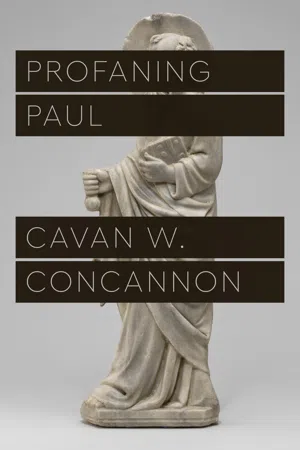1. In his important study of the Bible in early modernity, Vincent Wimbush points to how it is not just naïve to believe that the Bible transcends the vagaries of politics: “In point of fact, such an assumption, which aims to make us believe ‘religion’ is above and beyond the usual dynamics of power relations, is itself the most profound effect of the power dynamics.” Wimbush, White Men’s Magic: Scripturalization as Slavery (Oxford: Oxford University Press, 2012), 111.
2. It is not the case that slavery was universally accepted in Paul’s world. Philo of Alexandria tells us that the Jewish sect he knows as the Therapeutae rejected the ownership of slaves as contrary to nature (De vita contemplativa, §70).
3. Taubes’s seminar was published as Jacob Taubes, The Political Theology of Paul, trans. Dana Hollander (Palo Alto, CA: Stanford University Press, 2004); originally published as Die Politische Theologie des Paulus (Munich: Wilhelm Fink Verlag, 1993). Stanislas Breton, A Radical Philosophy of Saint Paul, trans. Joseph N. Ballan (New York: Columbia University Press, 2011); originally published in French as Saint Paul (Paris: Presses universitaires de France, 1988).
4. Ward Blanton has shown that the philosophical engagement with Paul has a much longer history, even if Taubes and Breton can be credited with starting up the conversation anew in particular ways. See his Displacing Christian Origins: Philosophy, Secularity, and the New Testament (Chicago: University of Chicago Press, 2007) and A Materialism for the Masses: Saint Paul and the Philosophy of Undying Life (New York: Columbia University Press, 2014).
5. Alain Badiou, Greece and the Reinvention of Politics, trans. David Broder (London: Verso, 2018), 2–4.
6. See also on this point Jacques Rancière, Moments Politiques: Interventions 1977–2009 (New York: Seven Stories Press, 2014), 189–202.
7. One of the earliest and best formulations of this project is Neil Elliott’s Liberating Paul: The Justice of God and the Politics of the Apostle (Maryknoll, NY: Orbis, 1994). For a critical summary and methodological reevaluation of these studies, which are too many to list, see Christoph Heilig, Hidden Criticism? The Methodology and Plausibility of the Search for a Counter-Imperial Subtext in Paul (WUNT, 392. Tübingen: Mohr Siebeck, 2015; reprint, Minneapolis: Fortress Press, 2017).
8. I am reflecting here on the work of Elisabeth Schüssler Fiorenza, Rhetoric and Ethic: The Politics of Biblical Studies (Minneapolis: Fortress Press, 1999); and Elizabeth A. Castelli, Imitating Paul: A Discourse of Power (Louisville, KY: Westminster/John Knox Press, 1991).
9. Clarice J. Martin, “The Haustafeln (Household Codes) in African American Biblical Interpretation: ‘Free Slaves’ and ‘Subordinate Women,’” in Stony the Road We Trod: African American Biblical Interpretation, ed. Cain Hope Felder (Minneapolis: Fortress Press, 1991), 218–27.
10. Bernadette J. Brooten, “Paul’s Views on the Nature of Women and Female Homoeroticism,” in Immaculate and Powerful: The Female in Sacred Image and Social Reality, ed. Clarissa W. Atkinson, Constance H. Buchanan, and Margaret R. Miles (Boston: Beacon, 1985), 61–87. See also Dale B. Martin, “Heterosexism and the Interpretation of Romans 1:18–32,” Biblical Interpretation 3 (1995): 332–55; and “Arsenokoites and Malakos: Meanings and Consequences,” in Biblical Ethics and Homosexuality: Listening to Scripture, ed. Robert L. Brawley (Louisville, KY: Westminster/John Knox Press, 1996), 115–36.
11. Michel Foucault, “What Is an Author?,” in Language, Counter-Memory, Practice: Selected Essays and Interviews by Michel Foucault, ed. Donald Bouchard (Ithaca, NY: Cornell University Press, 1977), 113–38.
12. Elizabeth A. Castelli, “The Philosophers’ Paul in the Frame of the Global: Some Reflections,” South Atlantic Quarterly 109, no. 4 (2010): 653–76.
13. Brian Thill, Waste (New York: Bloomsbury Academic, 2015), 8. For a similar project linking waste to temporality, see William Varney, Waste: A Philosophy of Things (New York: Bloomsbury, 2014).
14. Melanie Johnson-DeBaufre and Laura S. Nasrallah, “Beyond the Heroic Paul: Toward a Feminist and Decolonizing Approach to the Letters of Paul,” in The Colonized Apostle: Paul through Postcolonial Eyes, ed. Christopher D. Stanley (Minneapolis: Fortress, 2007), 161–74.
15. Timothy Morton, Hyperobjects: Philosophy and Ecology after the End of the World (Minneapolis: University of Minnesota Press, 2013), 112.
17. Zygmunt Bauman, Wasted Lives: Modernity and Its Outcasts (Cambridge: Polity, 2004).
18. I do not claim to speak for or to have done justice to all minoritized and marginalized readers and readings of the Pauline archive. My specific focus on garbage and excrement in the Pauline archive has limited the range of scholarly exegetical work to those who have worked particularly on the passages in Philippians and 1 Corinthians where these images occur. For many marginalized communities, Pauline texts have not always been central to their theological and exegetical work. As such, my curation of voices is limited to authors who have directly engaged Paul and his archive.
19. Though they are not the only texts that purport to speak for and about Paul to survive from antiquity, they are the only ones, along with the canonical Acts of the Apostles, that are treated as canon by ...
